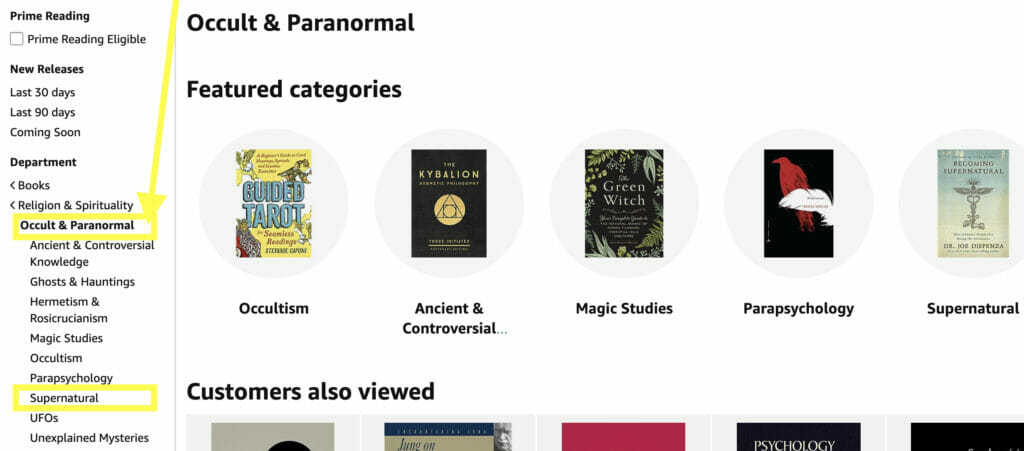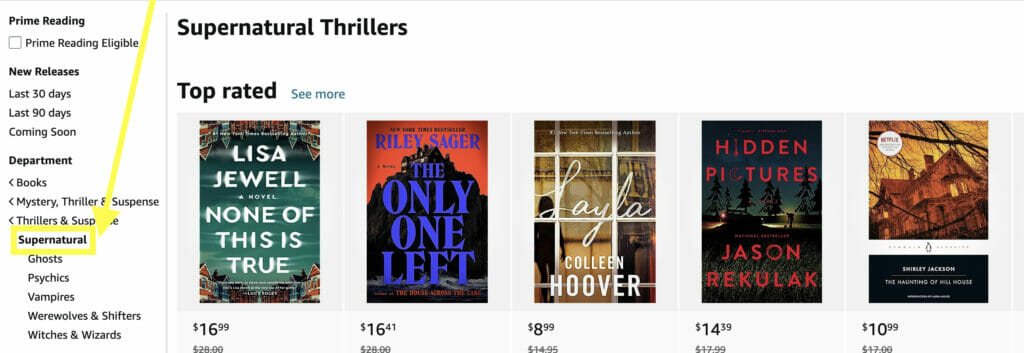Some will say that book genres don’t really matter much, and you should just write the book you want to write. While we agree, it’s also important to know things like which supernatural fiction subgenres your story belongs to in order to meet reader expectations and show up in the right places when they search for a new book.
Without this, you could leave readers disappointed. Or worse, you won’t have any readers at all because they weren’t able to find your book—one filled with things they love—in the right subgenre they’re searching in.
And when it comes to the supernatural genre by itself, things can get confusing! Is it fantasy? Paranormal? What about romance? How do you fit all of those together in order to best reach your intended audience?
Deep breaths! It can be confusing, but we’ll clarify it with this blog post.
Here’s what you’ll learn about supernatural fiction subgenres:
- What is supernatural fiction
- Supernatural vs Paranormal vs Fantasy Genres
- Why supernatural fiction subgenres matter
- 7 popular supernatural fiction subgenres
- How to get started writing it
What is supernatural fiction?
Supernatural fiction is any literature that contains elements of nature that have become “super”, like werewolves, shifters, vampires, witches, and more. The distinction is that which is different than what occurs in nature, but in a manner that gives it power, which is where the “super” comes from.
Supernatural vs Paranormal
While supernatural and paranormal are often used interchangeably nowadays, they are significantly different. However, both of these are typically housed within the fantasy genre if they contain magic of any kind.
The difference between supernatural and paranormal can be pointed out using the actual words themselves:
Paranormal:
para – meaning next to or adjacent to
normal – meaning ordinary or consistent with our own experiences.
This means that anything paranormal would be similar to normal experiences, but not quite. It’s the unexplainable instances that “seem normal” but can’t be explained away with what we know to be true about life. This would encompass things like UFOs, cupboards opening and closing of their own volition, items in the house being misplaced though you haven’t moved them. These are all normal things, but it’s the explanation that can’t be offered by “normal” occurrences. You’ll find many ghost stories in the paranormal genre.
As it happens, if you go to Amazon and search for the paranormal subgenre, you’ll actually find it under “Religion & Spirituality” instead of a fantasy-type genre. You can also see in the image below another place where the “supernatural” subgenre lives.

Supernatural:
super – meaning over and above
natural – meaning of nature
Supernatural would be anything that is over or above that which is normal. If you take witches and vampires, for example, they are normal humans that have been made to be over or above in the abilities of a normal human. The same goes for any creatures like shifters or werewolves; animals and humans made “super”.
While these are different genres and contain different elements, many people now will use them to mean the same thing, and it almost always encompasses vampires, witches, demons, ghosts, and the like.
Why do supernatural fiction subgenres matter?
There are two primary reasons to know which supernatural fiction subgenres your book falls under:
1. For the Reader:
The supernatural genre on its own is very large and very broad. You can get a range of book types, like a cozy witch mystery series and an occult horror with vampires.
These two books are completely different and appeal to very different audiences, despite both being in the supernatural genre as a whole. That’s why you need subgenres. They help readers identify whether or not your book is for them. This leads to, overall, more buyers of the right kind who will leave good reviews on your book because it’s one they like. I can’t tell you how many times I’ve read 3-star book reviews that are along the lines of, “I didn’t like how much romance was in this book,” on books that are in a broader genre.
2. For the Author:
As an author, writing a quality novel also depends on the subgenre because of its expectations. Certain supernatural fiction subgenres may have sad endings, while others need happily-ever-afters. Knowing which subgenre you’re writing in will help you plot your novel immensely, and make it that much easier to construct a good book that readers will like.
7 Popular Supernatural Fiction Subgenres with Examples for Each
Finding the popular supernatural fiction subgenres is actually really easy. So before I list them here, I’ll just show you how to do it yourself—and how you can do this for any genre you want to write in, especially if you want to write to market.
First, go to Amazon and choose “books” from the dropdown in the search bar and hit “enter”. Then scroll down and look at the left side where you’ll eventually see a list of genres. Click on “Mystery, Thriller & Suspense”. Then click on “Thrillers & Suspense”. The menu will narrow again to show you additional options, one of which is “Supernatural”.

Above you can see that beneath this are Amazon’s pre-determined “most popular” supernatural fiction subgenres. But that’s not the end of the list! There are categories (and therefore genres) that Amazon doesn’t show you in the searches, but the authors will place their books here. Amazon uses these in order to recommend and show books to buyers who have bought other books in those same categories.
P.S.– this works for other book genres aside from only supernatural, too.
Here are the most popular supernatural fiction subgenres with some book examples:
1. Ghosts
As you can imagine, any ghost stories will fall under this supernatural subgenre. Many ghost novels also accompany other elements, and it’s not uncommon to find a genre like this paired with another like “vampires” or even “occult fiction”.
Here are a few examples of supernatural ghost books:
- The Haunting of Brynn Wilder by Wendy Webb
- Whickering Place by London Clarke
- A Ghost of Christmas Past by Anthony M. Strong
- Path of Bones by Cassie Quinn
- Hidden Pictures by Jason Rekulak
2. Psychics
Psychic thrillers often fall under the supernatural fiction subgenres umbrella. Keep in mind, though, that even within this subgenre, you can get wildly different types of stories. So keep an eye out for additional subgenres to place your book in.
Here are examples of psychics in supernatural fiction:
- Mr. Mercedes by Stephen King
- Intercepts by TJ Payne
- Time to Kiln by Nova Nelson
- A House of Bells by J.T. Croft
3. Vampires
One of the most popular of the supernatural fiction subgenres is vampires. These can also range from romance to horror in other genres, so make sure you’re taking into account that aspect of this one.
Here are some book examples from the vampire subgenre:
- Dracula by Bram Stoker
- Interview with the Vampire by Anne Rice
- Twilight by Stephenie Meyer
- Let the Right One In by John Ajvide Lindqvist
- A Discovery of Witches by Deborah Harkness
4. Werewolves & Shifters
Another subgenre on the rise, and even rivaling vampires in recent years, is anything with a werewolf or other shifters. Shifters are basically any person who can shift into an animal form. This often pairs with a “fated mates” trope that’s becoming popular with romance shifter stories.
Here are some examples of this subgenre:
- Kane by Dick Wybrow
- What Vengeance Comes by Anthony M. Strong
- The Witch’s Familiar by TJ Nichols
- Twisted by N Gray
- Sapphires & Souls by Parker Blue
5. Witches & Wizards
We all know this one. Oftentimes, books with witches and wizards ends up in the fantasy genre, but the other elements within the story can put it in the supernatural category first. Keep in mind that this is one of the supernatural fiction subgenres that varies greatly in terms of type of story.
Here are some examples:
- Blue Moon Investigations by Steve Higgs
- ImPerfect Magic by C.N. Rowan
- Tales of a Witch by Kim Richardson
- Spells & Death by Rachel Medhurst
- Accidental Magic by Iris Beaglehole
6. Occult Fiction
Occult fiction is interesting in that it’s technically in the horror genre, but contains supernatural elements and refers to books that contain principles of right and wrong, righteousness and even religious philosophy. You’ll often find books with demons, possession, devils, and the like in occult fiction.
Here are some occult fiction examples:
- Haunting Adeline by H.D. Carlton
- Good Omens by Terry Pratchett
- Ramses and the Damned by Anne Rice
- Pet Sematary by Stephen King
7. Horror
Many of the examples above can also be in the horror subgenre. When you get the combination of vampire fiction with horror fiction, you get the tone of the story. This is super important for readers to understand when buying your book because those looking for a spicy romance with vampires will be very upset with a horror novel featuring vampires.
Here are some examples of horror novels to learn from:
- Holly by Stephen King
- The Book of Azrael by Amber V. Nicole
- Layla by Colleen Hoover
- Scream for Us by Molly Doyle
- Sing Me To Sleep by R.M. Virtues
Getting Started with Writing Supernatural Fiction
Now that you know the options available to write your book, it’s time to get started! Here are some brief tips for starting your supernatural book.
1. Confirm your idea
Jot down all the ideas you have for this story. This would include any characters, plot points, the type of story you want to tell, and of course any magical or supernatural elements you’ll want to use.
You’ll also want to write down the style or tone you’re going for. Will it be a bright and funny story? Will it be a mystery? Will it contain dark and horrific elements? Suspense? Thriller? Write it all down.
2. Determine the supernatural fiction subgenres
Based on the above information you wrote down, it’s time to pinpoint your supernatural fiction subgenres. Yes, you can have more than one! Will it be a vampire horror? Will it be an occult ghost story? Remember to keep the tone in mind and pair it with the subgenres you think are most fitting—and don’t forget to peek at the examples we gave you to compare!
3. Know your tropes
Tropes are common occurrences in the elements and characters for a story—ones readers like! This could be anything ranging from a love triangle, enemies to lovers, fated mates, and the like. Of course, there are more than just romance tropes, but knowing the tropes usually involves reading a lot of the genre.
Read some examples! If you’ve read a lot in supernatural fiction subgenres already, then try to think about some recurring elements you’ve noticed in the plot devices and such.
4. Develop characters
Remember that all your characters should be round and fully developed. What could be fun is also taking the subgenre you have and picking a character type that would belong in a different one. For example, if you want to write werewolf shifter story that’s light-hearted and romantic, choose a character you might see in a horror novel to bring into it.
Mix and match! Get creative so you break norms and branch out into your own unique story.
5. Plot your story!
When you have the supernatural fiction subgenres, know your characters, and have a general plot idea, it’s time to put them in action and make them concrete. The plot should involve:
- The introduction
- The inciting incident
- Part 1
- Part 2
- Part 3
- Resolution
This is a classic 3-act format for a novel, but you can always tweak it for your own story and make it yours.
If you’re looking for help getting started with bringing a supernatural novel to life, sign up for this class to get the framework you need for a quality novel:
